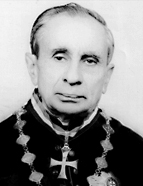

Avelino de Jesus da Costa was born on 4 January 1908, in Barral, in the parish of Vila-Chã (São João), in the municipality of Ponte da Barca, and passed away in Braga on 17 October 2000. He was the son of José António da Costa and Antónia Maria Gonçalves. Due to his father's job as an employee of the Railway Company, he moved with his family (he was the youngest of three siblings) to Lisbon, where he attended primary school in the old parish of Madalena (now part of the parish of Santa Maria Maior).
Early on, he became known for his dedication to literature and showed a strong inclination toward ecclesiastical life. His primary school teacher, along with a benefactor from Moledo do Minho, offered to cover the costs of his entry into the seminary. He returned to his native Minho to attend the Braga Minor Seminary, enrolling there on 7 January 1920. In 1928, he completed his studies in Humanities with "Distinction" and earned his Philosophy degree with "Distinction with Honours." He then continued his education at the Theological Seminary in Braga. The following year, under the orders of the Prelate of the diocese, Manuel Vieira de Matos, he went to Rome to study at the Gregorian University, enrolling in Philosophy. In 1930, he graduated with a bachelor's degree, receiving the classification "Cum laude probatus." However, due to a serious illness, he was forced to return to Portugal, where he re-entered the Theological Seminary in Braga and completed his studies in 1933 with a grade of 19 points. He was ordained a priest on August 15 of the same year and, on 5 December 1972, was appointed Canon of the Chapter of the Primate Cathedral of Braga. Among his priestly duties, he supported the Teresian Sisters in Braga, and later, in keeping with his Marian and Fatimist devotion, he actively promoted and strengthened the works at the Santuário de Nossa Senhora da Paz [Shrine of Our Lady of Peace] in his home village. He also founded and directed the bimonthly newsletter Mensagem de Paz [Message of Peace] (1970–1977), serving as both its director and editor-in-chief, positioning it as the voice of the institution.
